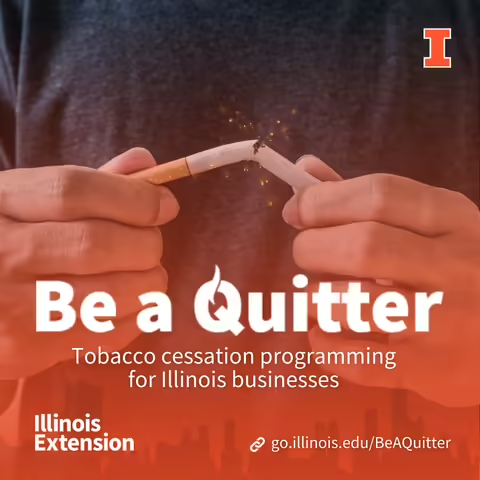URBANA, Ill. – Tobacco use comes with a heavy price to the state and nation, with tobacco-related illnesses estimated to contribute to more than $225 billion in direct medical care costs each year, including $156 billion in lost productivity. Although employer-sponsored tobacco cessation programs provide one effective means to help individuals quit, many employers, particularly small businesses, are unable to provide these programs.
The newly launched University of Illinois Extension Be A Quitter project is designed to change that by paving a way for small businesses throughout Illinois to offer a leading tobacco cessation program to their employees. The collaborative effort between Illinois Extension and University of Illinois Urbana-Champaign comes at no cost to employers or employees.
The Be A Quitter project provides businesses the premium EX program, which has been rigorously tested and boasts one of the most successful participant quit rates of any tobacco cessation program. The program is available in English and Spanish.
"We've tried to remove as many barriers as possible to allow businesses to participate in a project that encourages employees to become tobacco-free,” says project director Allen Barton, Illinois Extension specialist in substance use and family health. Barton also serves as an assistant professor in Human Development and Family Studies within the College of Agricultural, Consumer and Environmental Sciences at Illinois.
“Our mission at Illinois Extension is to provide unbiased, research-based solutions to the challenges faced by Illinois residents, families, communities, and businesses,” says Barton. “This project does exactly that.”
Upon enrollment, participating businesses receive materials to promote employee participation, with all remaining activities managed by the project team and program developer. There are no long-term contracts or commitments required from businesses that enroll.
The cost of employee participation is covered by a research study affiliated with the project. As part of this study, individuals complete five brief online surveys over the course of 12 months during which they have access to the EX program.
All participating individuals receive a personalized quit plan with interactive exercises, educational videos, and email support. Additional features of the program include:
- Live chat coaching with tobacco treatment experts
- Access to the longest-running, largest community of current and former tobacco users
- Tailored text messaging to help participants quit and stay tobacco-free
- Nicotine replacement therapy in the form of patches, gum, or lozenges
“Whether you view it from the perspective of public health, economics, or the workplace, helping people quit tobacco is one of the most powerful ways to transform the lives of Illinois residents and communities,” says Barton. “We’re hopeful businesses throughout the state join us in this effort while this project remains available and open for enrollment.”
To learn more about the project and to enroll, Illinois businesses can visit go.illinois.edu/BeAQuitter or contact hdfs-illinoisunited@illinois.edu.
SOURCE: Allen Barton, Substance Use and Family Health Specialist, University of Illinois Extension
WRITER: Liz Smith, Media Communications Coordinator, University of Illinois Extension
ABOUT EXTENSION: Illinois Extension leads public outreach for University of Illinois by translating research into action plans that allow Illinois families, businesses, and community leaders to solve problems, make informed decisions, and adapt to changes and opportunities.
